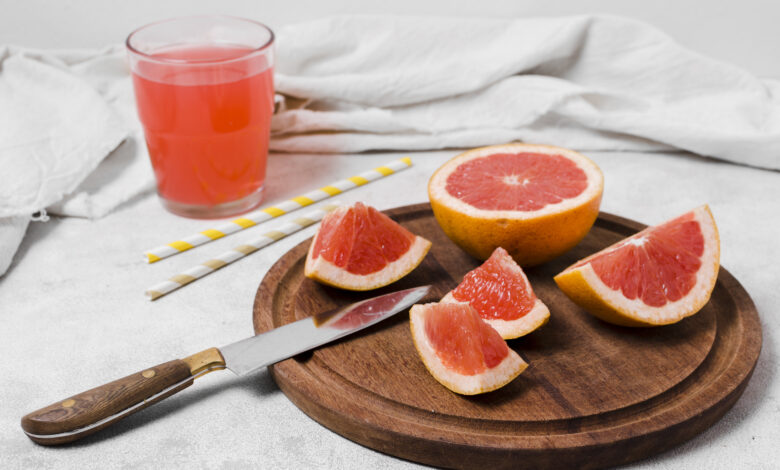Grapefruit Juice: Is It Affecting Your Medication?

Grapefruit juice is often celebrated for its refreshing taste and health benefits, including being rich in vitamin C and antioxidants. However, a lesser-known fact about this popular beverage is its potential to interfere with medications. If you regularly enjoy grapefruit juice but also take prescription or over-the-counter drugs, it’s essential to understand how this interaction can affect your health.
The Grapefruit Effect: Why It Happens
The interaction between grapefruit juice and certain medications is primarily due to compounds known as furanocoumarins. These compounds inhibit the action of an enzyme in the small intestine called CYP3A4. This enzyme plays a key role in metabolizing many drugs, helping to break them down so they can be effectively absorbed by the body.
When grapefruit juice inhibits CYP3A4, more of the drug enters your bloodstream than intended, potentially leading to higher drug concentrations. This can amplify the effects of the medication, increasing the risk of side effects or even toxicity.
Medications Affected by Grapefruit Juice
Grapefruit juice interacts with a wide range of drugs, including:
- Cholesterol-Lowering Statins
- Medications like atorvastatin, simvastatin, and lovastatin are commonly prescribed to manage cholesterol levels. Grapefruit juice can increase the concentration of these drugs in the bloodstream, heightening the risk of muscle damage and liver problems.
- Blood Pressure Medications
- Calcium channel blockers such as amlodipine, felodipine, and nifedipine are used to treat high blood pressure. Grapefruit juice can enhance their effects, potentially causing dangerously low blood pressure or irregular heart rhythms.
- Immunosuppressants
- Drugs like cyclosporine and tacrolimus, used to prevent organ transplant rejection, can become overly potent when combined with grapefruit juice, increasing the likelihood of side effects.
- Antidepressants and Anti-Anxiety Medications
- Grapefruit juice can also affect selective serotonin reuptake inhibitors (SSRIs), such as sertraline and fluvoxamine, intensifying their effects and potentially causing side effects like drowsiness or confusion.
- Antihistamines
- Fexofenadine, an antihistamine used for allergies, may have reduced effectiveness when taken with grapefruit juice. Unlike the other examples, the interaction here limits the drug’s absorption rather than increasing it.
Why Grapefruit Juice Interactions Are Risky
The consequences of grapefruit juice interactions depend on the drug and the individual. For some medications, increased drug levels might lead to side effects like nausea, dizziness, or headaches. For others, the risks are more severe, including kidney damage, gastrointestinal bleeding, or life-threatening heart arrhythmias.
It’s also worth noting that the effect isn’t limited to fresh grapefruit juice—other grapefruit products, like marmalade, can also interfere with medication.
How Much Grapefruit Juice Is Too Much?
Even a small amount of grapefruit juice can have a noticeable impact. Studies suggest that as little as one glass can significantly alter drug metabolism, and the effects may last for up to 24 hours. This means that even if you don’t drink grapefruit juice daily, occasional consumption can still lead to drug interactions.
Are Other Citrus Fruits a Concern?
While grapefruit is the primary culprit, other citrus fruits like Seville oranges (used in marmalade), pomelos, and limes may also contain furanocoumarins and could cause similar interactions. However, common oranges and orange juice are not known to affect drug metabolism in the same way.
Tips to Stay Safe
To minimize the risk of grapefruit juice interactions:
- Read Medication Labels
- Many medications include warnings about grapefruit juice. Always check the label and follow any specific instructions.
- Consult Your Healthcare Provider
- If you’re unsure whether grapefruit juice could interact with your medications, ask your doctor or pharmacist. They can provide guidance tailored to your specific prescriptions.
- Explore Alternatives
- If you enjoy citrus beverages, consider switching to orange juice or other fruits that don’t pose the same risks.
- Timing Matters
- In some cases, separating grapefruit juice consumption from medication intake by several hours may reduce the risk of interactions. However, this approach should only be taken under medical advice.
What If You’ve Already Been Drinking Grapefruit Juice?
If you’ve been consuming grapefruit juice while on medication and suspect an interaction, contact your healthcare provider immediately. They may adjust your dosage, suggest alternative medications, or recommend discontinuing grapefruit juice.
Final Thoughts
Grapefruit juice is undoubtedly a nutritious and delicious addition to your diet, but its potential to interfere with medications shouldn’t be overlooked. Understanding these interactions is a crucial step in managing your health and ensuring that your medications work as intended.
By staying informed and working closely with your healthcare provider, you can safely enjoy grapefruit juice while minimizing risks to your well-being. Always prioritize communication with medical professionals to make the best decisions for your health.




